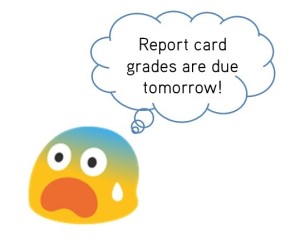Main Body
Classroom Policies
21. Required Materials
Students need to know what to bring to class on a regular basis. Consider the needs for each class you teach and list them below:
Class 1: ________________________________________________________
Class 2: ________________________________________________________
Class 3: ________________________________________________________
Class 4: ________________________________________________________
Class 5: ________________________________________________________
22. Eliminating Acts of Sabotage
 It’s important for students to learn responsibility. However, some students willingly and regularly sacrifice learning by deliberately coming to class unprepared. Some teachers say, “Too bad; your loss.” However, with teachers and students being held directly accountable for learning, that kind of response seems ill-advised. The learning must happen! A better approach might be to provide materials for student use with some kind of “fee” involved. Here are two possibilities:
It’s important for students to learn responsibility. However, some students willingly and regularly sacrifice learning by deliberately coming to class unprepared. Some teachers say, “Too bad; your loss.” However, with teachers and students being held directly accountable for learning, that kind of response seems ill-advised. The learning must happen! A better approach might be to provide materials for student use with some kind of “fee” involved. Here are two possibilities:
Examples
- Give materials to students for a “rental fee” that is deducted from participation points.
- Loan materials but require collateral that is returned to the student when the borrowed materials are returned to you. (A shoe makes great collateral!)
My policy for dealing with students who forget materials
_______________________________________________________________________________
_______________________________________________________________________________
_______________________________________________________________________________
23. Hall Passes

Many students spend an inordinate amount of time and energy trying to get out of class and into the halls. You need a policy for hall passes. If there is no school-wide policy, create your own. Here are some ideas:
Examples
- Write an individual pass for each request and keep a record. Excessive requests = end of hall pass privileges.
- Grant passes on an emergency basis only. (Some schools institute a passes only in case of the four B’s: barfing, bleeding, burned, or broken bones.) Too many “emergencies” mean a phone call home and/or to the designated health staff member.
- Each marking period, give students a certain number of generic passes they can use to go their lockers or to the bathroom. Unused passes can be turned in for treats or extra credit.
- Give out coupons as rewards for class participation or as an alternative for extra credit. These coupons can be used for late work, bathroom passes, and/or locker passes.
My policy for hall passes (nurse/locker/bathroom/etc.)
_______________________________________________________________________________
_______________________________________________________________________________
_______________________________________________________________________________
Note: Make sure no student leaves without a pass, and that only one student leaves at a time. Emphasize that school nurses/office staff are there for emergency situations and legally mandated medical services for specific students. Keeping band-aids in your room will reduce students’ trips out of the room.
24. Dealing with Tardy Students
Dealing with tardy students involves both policy and procedure. Define exactly what you mean by being “tardy” to class. Here are some possibilities:
Examples
- Students who are not in their seats and ready to work when the bell rings are tardy.
- Students who are not in the room when the bell rings are tardy. (Some teachers make exceptions for students who obviously are hurrying to get to class and just don’t quite make it in time.)
- Students who enter class after the door has been closed are tardy.
!["Despertador" by Henrique Simplicio [CC-BY 2.0] https://flic.kr/p/f1JxBL](https://milnepublishing.geneseo.edu/app/uploads/sites/16/2016/12/9197295814_c98a3aeba3_z-300x199.jpg)
My definition of tardy
_______________________________________________________________________________
_______________________________________________________________________________
_______________________________________________________________________________
Have a definite procedure that tardy students enter without disruption and bring a pass if it is an excused tardy. No “going back” for a pass!
Excused Tardies
- Give the pass directly to the teacher.
- Put the pass in a specific place and take their seats.
My excused tardy procedure
_______________________________________________________________________________
_______________________________________________________________________________
_______________________________________________________________________________
Unexcused Tardies
You also need a procedure for tardy students who enter class without a pass. Here are some choices:
- Jot down the student’s name or mark it on your attendance sheet.
- Have the students write their own names on an unexcused tardy list that has a place for name, date, and arrival time.
- Have the students fill out a tardy form that they put in a specific place.
My unexcused tardies procedure
_______________________________________________________________________________
_______________________________________________________________________________
_______________________________________________________________________________
You also need to consider the in-class consequences, if any, for students who have an unexcused tardy.
- Let the students start any work already in progress but give no extra time to complete it.
- Give a zero for any work already in progress.
My natural consequences for unexcused tardies
_______________________________________________________________________________
_______________________________________________________________________________
_______________________________________________________________________________
Note: At some point, unexcused tardies may become an issue that requires more formal intervention. Check with other teachers and school policies as needed.
25. Homework
If assigning homework in some form is a reality for you, you need a consistent procedure for making that happen. Here are some possibilities:
Examples
- Have a large homework calendar that you keep in the room. Post and verbally announce assignments.
- Publish a weekly assignment schedule.
- On the first day of the school week, have students copy the week’s homework on an assignment calendar.
- Post homework at the beginning of class as part of the day’s plan. (Be aware that this encourages some students to sneak class time to get their homework done.)
- Use the last ten minutes of class to announce the homework and then let students get started so they can ask any questions they need to.

My system for assigning homework
_______________________________________________________________________________
_______________________________________________________________________________
_______________________________________________________________________________
Note: It would be worth your while to consult The Homework Myth by Alfie Kohn and “As Homework Grows, So Do Arguments Against It” in the September 12, 2006 Washington Post article by Valerie Strauss found at washingtonpost.com.
26. Make-Up Work
School handbooks usually define what constitutes excused and unexcused absences, whether missed work can be made up for credit or not, and the number of days students have to complete it. What remains for you to decide is what your procedure will be.
Make sure your procedure keeps students from interrupting you during direct instruction or coming to you and asking, “Did I miss anything?” Here are some possibilities:
Make-Up Work for Excused Absences
Examples
- The teacher takes the responsibility for giving students all the necessary make-up work and negotiates a due date.
- Teachers make folders for absentees. Returning students check their folders for missed work.
- Students check a posted assignment calendar or online listing. Then they get any papers they need from a “make-up” basket.
- Teachers assign “study-buddies” who collect work for absent students and give it to their returning partners.
Joanie Funderburk uses a class log system. Each day one student in each class completes a log of what took place. They put it and any necessary papers in a folder that previously absent students check when they return. Please see “Class Log” for a class log based on the one Joanie uses.
My policy for make-up work from excused absences
_________________________________________________________________________
_________________________________________________________________________
_________________________________________________________________________
My procedure for getting and handing in make-up work from excused absences
_______________________________________________________________________________
_______________________________________________________________________________
_______________________________________________________________________________
Make-Up Work for Unexcused Absences

You need to know the school policy for what constitutes an unexcused absence. For example, are suspensions out of school regarded as unexcused absences? You also need to know how long students have to clear unexcused absences. There also may be a policy that says that students can complete work from unexcused absences and turn it in, but you do not have to grade it or give any credit.
My definition of an unexcused absence
_______________________________________________________________________________
_______________________________________________________________________________
_______________________________________________________________________________
My policy if I accept make-up work from unexcused absences
_______________________________________________________________________________
_______________________________________________________________________________
_______________________________________________________________________________
Class Log
Name of Class _____________________________ Period _______
Date _________ Note Taker _______________________________
Student(s) Absent _______________________________________
____________________________________________________
Quiz/Test Given (if any) Work Collected
_______________________________________________________________________________
_______________________________________________________________________________
_______________________________________________________________________________
Class Activities (Please include any notes and examples.)
_______________________________________________________________________________
_______________________________________________________________________________
_______________________________________________________________________________
Announcements/Important Information
_______________________________________________________________________________
_______________________________________________________________________________
Homework Assigned
_______________________________________________________________________________
_______________________________________________________________________________
_______________________________________________________________________________
Based on a log developed by Joanie Funderburk, Cherry Creek Schools, and used with her permission
27. Late Work

Late work is work that is not ready to be handed in when the assignment is collected. Common exceptions are for students who are staffed in special education and have an Individual Education Plan (IEP) that mandates that they get extra time or for students who get more time because of accommodations mandated in a 504 Plan. If your school does not have a formal late work policy for you to follow, here are some options to consider:
Examples
- Accepting late work on a regular basis sends the wrong “life message” to students and creates a grading nightmare for teachers. Therefore, many teachers never accept late work.
- Late work should not be accepted on a regular basis, but we all have bad days. Therefore, give students one “reprieve” per grading period. You can give an automatic amnesty for one late paper or give coupons that can be used for late work, treats, and/or extra credit. Another possibility is to drop each student’s lowest score per quarter. (Grades on major tests or projects are excluded.)
- Accept late work but reduce the percentage of credit given according to the number of days the work is late. For example, one day late = 80% credit.
My policy for late work
_______________________________________________________________________________
_______________________________________________________________________________
_______________________________________________________________________________
Note: If you do accept late work, be sure you establish the procedure for turning it in. Also, establish a clear due date for it to be turned in. Otherwise you will be sitting up all night grading papers the night before report card grades must be submitted.
28. Extra Credit
 Giving a few extra credit points for more challenging questions on tests or as rewards for special effort is not a problem. However, giving extra credit that can have a major impact on a final grade, especially accepting extra credit that consists of mountains of “stuff” that students throw together at the last minute in a desperate attempt to raise their grade, is not in the best interests of the students and creates incredible last-minute stress for you.
Giving a few extra credit points for more challenging questions on tests or as rewards for special effort is not a problem. However, giving extra credit that can have a major impact on a final grade, especially accepting extra credit that consists of mountains of “stuff” that students throw together at the last minute in a desperate attempt to raise their grade, is not in the best interests of the students and creates incredible last-minute stress for you.
Russ Doren says it best: “Extra credit is NOT substitute credit.”
Extra credit work should be thoughtful work, assigned with the goal of expanding a student’s knowledge. Define extra credit in these terms, insist that students complete a formal proposal for any extra credit work they want to complete, and make extra credit due before the last minute.
Proposal writing has two advantages. First, it discourages “substitute credit” seekers. Second, it gives an excellent framework for those students who truly want to learn more.
My extra credit policy
_______________________________________________________________________________
_______________________________________________________________________________
My extra credit procedure
_______________________________________________________________________________
_______________________________________________________________________________
Following is a sample extra credit proposal.
Extra Credit Proposal
Name of class __________________________ Period ______
Title of project ______________________________________
Summary of project ___________________________________
______________________________________________________________________________
_______________________________________________________________________________
_______________________________________________________________________________
Form of final product (written report, video, etc.) ________________
_______________________________________________________________________________
How project will be publicized (report to class, displayed in school, etc.)
_______________________________________________________________________________
_______________________________________________________________________________
Materials/resources needed ______________________________________
_______________________________________________________________________________
Proposed budget total _________________________________________
Itemized estimate _____________________________________________
_______________________________________________________________________________
______________________________________________________________________________
_______________________________________________________________________________
How project will be evaluated ____________________________________
Amount of extra credit requested_______ Amount granted________
Teacher’s signature of approval ________________________
Date of approval ____________________________________
This project must be turned in at the end of the school day on ________

